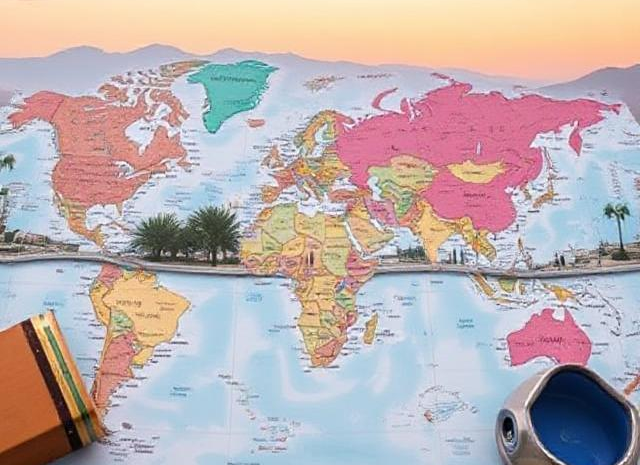
Understanding Travel Advisories And How They Affect Your Trip
Travel advisories are official notices issued by governments or international organizations that provide information and recommendations about the safety and security of traveling to specific destinations. These advisories can significantly impact your trip, as they provide critical information on potential risks and safety concerns in the country or region you’re planning to visit.
1. What Are Travel Advisories?
Travel advisories typically come from government bodies, such as the U.S. Department of State, Canada’s Foreign Affairs, or the UK Foreign, Commonwealth & Development Office, and provide updates on the safety and security situation in a given country or region. They often include information about:
- Political instability (e.g., civil unrest, protests, coups).
- Health risks (e.g., outbreaks of diseases like COVID-19, Zika virus).
- Natural disasters (e.g., earthquakes, hurricanes).
- Terrorism and violent crime (e.g., areas with active terrorist activity or high rates of crime).
- Travel restrictions (e.g., border closures, entry requirements like vaccinations).
Levels of Advisory: Travel advisories are often ranked by severity, which helps travelers understand the degree of risk. For example:
- Level 1: Exercise normal precautions (safe to travel).
- Level 2: Exercise increased caution (certain risks present).
- Level 3: Reconsider travel (increased risk, consider alternative options).
- Level 4: Do not travel (severe risk, avoid travel).
2. How Travel Advisories Affect Your Trip
A. Impact on Flight and Accommodation Bookings
- If an advisory is issued, especially for a Level 3 or Level 4 rating, you may face flight cancellations, changes, or limitations on your ability to travel. Airlines and hotels may offer to cancel or rebook flights and reservations for affected destinations.
- Some airlines may offer refunds or free rebooking if there is a government-issued advisory against traveling to your destination.
B. Insurance and Coverage
- Travel Insurance: Most standard travel insurance policies do not cover cancellations or delays caused by travel advisories. If you’re traveling to a region with a Level 4 advisory, your insurance policy may not cover emergencies like medical evacuation or trip cancellations.
- However, Cancel for Any Reason (CFAR) travel insurance may still offer coverage even if a travel advisory is in place, as long as the advisory falls within the terms of your policy.
C. Safety and Security Concerns
- A Level 3 or Level 4 advisory indicates that the area is not safe to visit. This may be due to ongoing conflict, civil unrest, or high crime rates, all of which pose significant risks to travelers.
- If you decide to travel to a country with a higher advisory level, you may face increased risks, such as violence, theft, or being caught in a political protest. It’s crucial to consider if the risks are worth it.
D. Legal Implications
- In some cases, governments may impose travel bans, forcing travelers to either stay home or evacuate a region if the situation becomes too dangerous.
- If you travel to a region with a Level 4 advisory, you may not be covered by your home country’s embassy or consulate, as they may not offer assistance to citizens in areas considered too risky.
3. How to Stay Informed About Travel Advisories
A. Government Websites
- Regularly check government travel advisory websites before planning a trip. These are updated with the latest information on safety, health, and security. Some examples include:
- U.S. Department of State: travel.state.gov
- UK Foreign, Commonwealth & Development Office: gov.uk/foreign-travel-advice
- Canada’s Travel Advisory Website: travel.gc.ca
B. Travel Apps and Alerts
- Many mobile apps and services, such as TripIt or Smart Traveler (U.S. Department of State), send push notifications or emails when advisories are updated for countries or regions you’re traveling to.
C. Embassy or Consulate Updates
- Contact your country’s embassy or consulate in the destination country to get the latest information on any security concerns or warnings. They can also provide local resources if you need assistance during your trip.
4. What to Do if You’re Already Traveling in an Area with a Travel Advisory
A. Monitor the Situation Closely
- Keep an eye on the news and any official government updates regarding the safety and security of your destination. This will help you stay ahead of any new developments and potential threats.
B. Follow Local Guidelines
- If you are already in a country with a travel advisory, follow local authorities’ instructions. This may include staying indoors during protests, avoiding certain areas, or taking extra precautions to stay safe.
C. Have an Emergency Plan
- Know the evacuation routes and nearest embassy or consulate locations in case of emergency. It’s also advisable to have access to a local emergency number (such as 911 in the U.S. or 112 in the EU).
- If the situation worsens and you feel unsafe, contact your travel insurance provider or your embassy to discuss evacuation options or support.
5. Should You Travel to a Country with a Travel Advisory?
A. Evaluate the Risks
- If the advisory is Level 1 or 2, it’s generally safe to visit with added precautions, such as avoiding certain areas, staying alert, and respecting local customs and laws.
- If the advisory is Level 3, you should carefully reconsider your plans and assess whether the risks of travel outweigh the benefits.
- A Level 4 advisory indicates serious risks (e.g., war, active terrorism, widespread violence) and typically means that travel is strongly discouraged. It’s advisable to avoid these destinations entirely.
B. Consider Travel Insurance
- If you decide to go ahead with travel despite the advisory, make sure your insurance policy covers issues related to the advisory (or purchase specialized coverage). Consider adding Cancel for Any Reason (CFAR) insurance if you are uncertain about your trip’s security.
C. Consult Local Advice
- Speak with locals or other travelers who are familiar with the region. They can provide valuable insights into the current situation and help you avoid potentially dangerous areas.

